Brian Thomas (1912–1989) OBE was a British artist best known for his decorative work in church buildings, particularly murals and stained glass.
Biography
Brian Thomas was born in Barnstaple, Devon, on 19 September 1912 to Frank and Margaret (née Lauder). He was educated at Bradfield College and awarded a science scholarship to study at Oxford University. He chose instead to attend the Byam Shaw School of Art in London. There he won a scholarship to the British School at Rome to study mural painting and travelled widely in Italy and Spain. During the war, he worked in the camouflage section of Home Security. From 1946 to 1954, he was principal of the Byam Shaw School of Art. He was a Master of the Art Workers Guild (1957)[1] and a Master of the Worshipful Company of Glaziers and Painters of Glass. In 1961 he was awarded the Order of the British Empire (OBE). He died on 13 December 1989, and a memorial service was held at St Giles in the Fields in London.;;[2][3][4]
A ‘Brian Thomas Memorial Prize’ (worth £2000 in 2018) is awarded by the Worshipful Company of Glaziers and Painters of Glass as part of its annual Stevens Competition for Architectural Glass.[5]
Iconography
A photograph of Thomas at work in his studio in St John's Wood, London, taken by Chris Ware (Keystone Features), about 1955, can be found in the Getty Images online database.[6] It shows him painting glass panels for newly commissioned altar rails at St George's Chapel, Windsor Castle. The chapel's altar-rails project is described, with images of the panels themselves, in the December 1956 Report of the Society of the Friends of St George's and Descendants of the Knights of the Garter[7]
List of works
- All Hallows by the Tower, London. Murai: The Last Supper.[8]
- All Saints, Compton, Hampshire. Stained glass: Madonna and Child and Deposition.[4]
- Bangor Cathedral, Wales. Murals:'The Risen Christ and Two Disciples Reach Emmaus on Easter Evening', with two others at the west end.(1934).[9]
- Brown's Cake Shop, Banbury, Oxfordshire. Mural depicting the history of Banbury. (1947); subsequently displayed in Banbury's Castle Quay Shopping Centre.[10]
- 43 Cloth Fair, London. Mural 'The Sailor's Home Coming'.[11][12]
- Fulham Palace, London. Murals: in the Chapel (1953).[13]
- Innholders Hall, London. Stained glass: The Three Masters Window, a collaborative work designed and made by 3 past masters of the Worshipful Company of Glaziers and Painters of Glass, specifically: Brian Thomas, Michael Farrar-Bell and Lawrence Lee.[4]
- St Andrew, Holborn, London. Mural and stained glass, each depicting doves.[4]
- St Andrew and St George, Stevenage. Stained glass: The Christian Year.[4]
- St Edward, New Addington, London. Stained glass: St. Edward and Symbols of Kingship, incorporating images of Melchizedek, Hezekiah, David and Solomon.[4]
- St George's Chapel, Windsor Castle. Six stained glass panels in the altar rails, 1955.[7]
- A collaboration with architects Seely & Paget.
- St John the Baptist Church, Peterborough. Stained glass (1968) depicting notable people connected to Peterborough: Symon Gunton, vicar of the parish during the plague, between 1665–7 (d.1676), Nurse Edith Cavell (d. 1915), Captain Thomas Mellows (d. 1944, fighting in the French Resistance), and William Law (d. 1761).
- St John, Clerkenwell, London. Priory chapel stained glass: Arms of Lord Webb-Johnson.[4]
- A collaboration with architects Seely & Paget.
- St John the Divine, Kennington, London. Murals, showing The Virgin Mary and Jesus in a Floral Garden, Lilies and Roses, Pièta. (1966).
- St John the Divine, Selsdon, London. Stained glass.[4]
- St Laurence, Tidmarsh, Berkshire. Stained glass depicting 22 scenes from the life of a deceased benefactor.[4]
- St Margaret, Ifield, Kent. Stained glass.[4]
- St Mark's, Regent's Park. Stained glass: St Peter and St Mark (1957).[4]
- St Mary Islington, London. Murals: Judgement and Eight Attributes of Christ, (c.1956).[4]
- A collaboration with architects Seely & Paget.
- St Mary, Long Ditton, Surrey. Stained glass: Annunciation.[4]
- St Mary, Maidenhead. Stained glass: Serpent of Paradise, Serpent of Healing, Sword of Spirit, Local scenes & connections, Suffer little children, Prodigal Son.[4]
- St Mary the Virgin, Twickenham. Stained glass depicting symbols of the Virgin Mary.[4]
- St Michael and St George, White City, London. Mural above the high altar (1954).[14]
- A collaboration with architects Seely & Paget.
- St Michael, Sutton Court, Chiswick, London. Stained glass: Samuel.[4]
- St Paul's Cathedral, London. Stained glass for the American and OBE chapels.[3]
- St Paul's Cathedral, Wellington. Stained glass: St Paul at the Areopagus (various windows, depicting scenes of the saint's life).[4]
- St Paul's Church, Bedford. Stained glass in celebration of the 400th anniversary of the Harpur Trust. (1976).[4]
- St Sepulchre without Newgate, London. Stained glass: Musicians window (Dame Nellie Melba, John Ireland, Sir Henry Wood and Walter Carroll.[4]
- St Vedast, Foster Lane, London. Stained glass: Scenes from the life of St Vedast. (1961).[4]
- Templewood House, Frogshall, Northrepps, Norfolk. Ceiling painting (1964) depicting scenes from the life of Paul Paget.[11][15]
- A collaboration with architects Seely & Paget.
- Westminster Abbey, London, Stained glass: Six Acts of Mercy in lancet windows below the north transept rose window.[3]
Gallery
.jpg.webp) Sianed glass, St John the Baptist Church, Peterborough
Sianed glass, St John the Baptist Church, Peterborough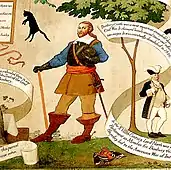 Detail of the Banbury mural
Detail of the Banbury mural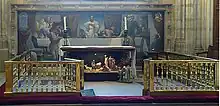 Mural 'The Last Supper' in All Hallows by the Tower, London. –
Mural 'The Last Supper' in All Hallows by the Tower, London. –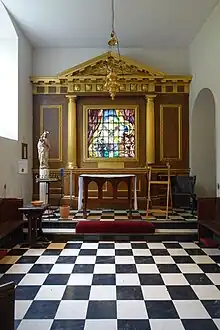 Stained glass, St Andrew Hoborn, London.
Stained glass, St Andrew Hoborn, London.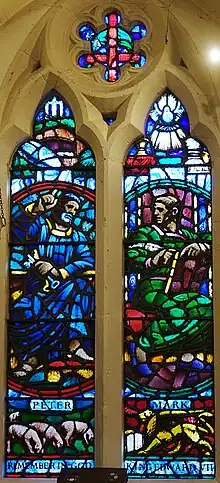 Stained glass, St Mark's Regent's Park, London.
Stained glass, St Mark's Regent's Park, London. Stained glass, St Vedast Foster Lane, London. –
Stained glass, St Vedast Foster Lane, London. –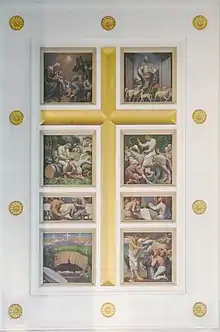 Mural, St Mary Islington, London.
Mural, St Mary Islington, London.
References
- ↑ "I. Formative Years". Journal of the Royal Institute of British Architects. 64: 218. 1957.
- ↑ 'The Original Banbury Cakeshop Mural' by Simon Townsend. The Cake and Cockhorse: Proceedings of the Banbury Historical Society (Vol. 18, No. 2, Spring 2010), pp. 44–48. Online resource. Retrieved 28 March 2019
- 1 2 3 Brian Thomas, Westminster Abbey website, online resource. Retrieved 28 March 2019.
- 1 2 3 4 5 6 7 8 9 10 11 12 13 14 15 16 17 18 19 20 'The Original Banbury Cakeshop Mural' by Simon Townsend. The Cake and Cockhorse: Proceedings of the Banbury Historical Society (Vol. 18, No. 2, Spring 2010) 'Appendix 1: Works by Brian Thomas', pp.48–49. Online resource. Retrieved 28 March 2019
- ↑ ‘Stevens Competition Winners 2018’. Website of ‘’The Worshipful Company of Glaziers and Painters of Glass’’. Retrieved 31 March 2019
- ↑ Portrait of artist Brian Thomas at work painting a glass mural for the Queen and the Duke of Edinburgh, at his studio in St John's Wood, London, circa 1955. Getty Images, online resource. Retrieved 30 March 2019
- 1 2 'The Altar Rails" by Canon E. M. Venables, in Report of the Society of the Friends of St George's and Descendants of the Knights of the Garter (December 1956), pp. 8–9 (with b/w images). Online resource. Retrieved 30 March 2019
- ↑ 'The Altar'. All Hallows by the Tower parish website, online resource. Retrieved 30 March 2019
- ↑ 'Features to note within the Cathedral'. Diocese of Bangor, Deanery of Ogwen, Cathedral Church of St Deniol, Bangor, online resource (PDF). Retrieved 30 March 2019
- ↑ Original Banbury Cakeshop Mural' by Simon Townsend. The Cake and Cockhorse: Proceedings of the Banbury Historical Society (Vol. 18, No. 2, Spring 2010) 42–53. Online resource. Retrieved 28 March 2019
- 1 2 Clive Aslet 'An Interview with the late PAUL PAGET 1901–1985' in The Thirties Society Journal, No. 6 (1987), pp. 16–25 (Published by The Twentieth Century Society.)
- ↑ The Sailors Return. London Walking Tours. Online resource. Retrieved 26 April 2019
- ↑ 'The Chapel' Archived 13 January 2013 at the Wayback Machine, Fulham Palace website. Retrieved 30 March 2019
- ↑ The Buildings of England. London 3: North West by Bridget Cherry and Nikolaus Pevsner (Yale University Press, 1991), 204.
- ↑ 'Templewood'. Historic England. Online resource. Retrieved 26 April 2019